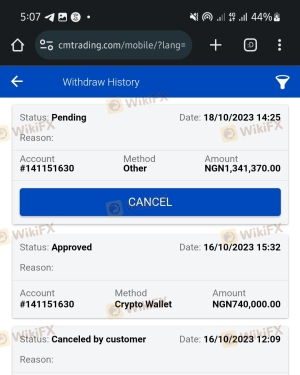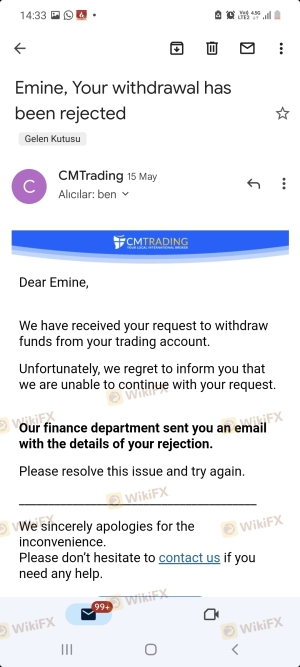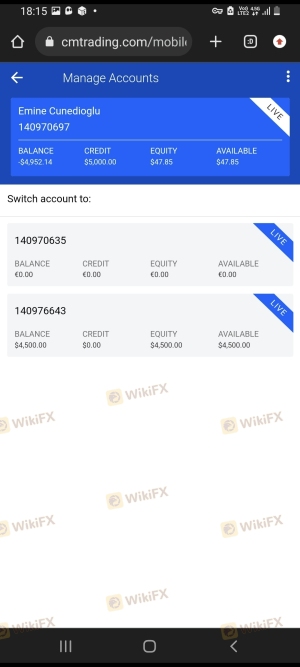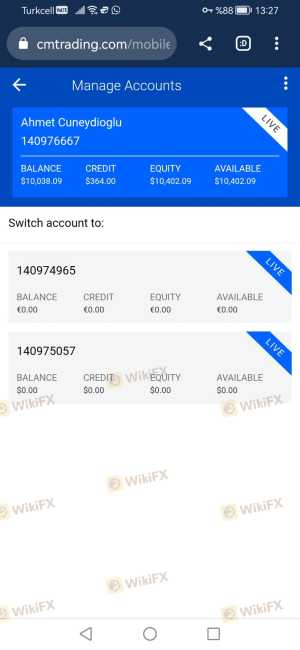Regarding the legitimacy of CMTrading forex brokers, it provides FSA, FSCA and WikiBit, (also has a graphic survey regarding security).
Is CMTrading safe?

Pros
Cons
Is CMTrading markets regulated?
The regulatory license is the strongest proof.
FSA Derivatives Trading License (EP)
The Seychelles Financial Services Authority
The Seychelles Financial Services Authority
Current Status:
Offshore RegulatedLicense Type:
Derivatives Trading License (EP)
Licensed Entity:
GCMT Limited
Effective Date:
--Email Address of Licensed Institution:
ibrahim@cmtrading.com, sylvie.hopeng@cmtrading.comSharing Status:
No SharingWebsite of Licensed Institution:
https://www.cmtrading.comExpiration Time:
--Address of Licensed Institution:
Unit A, House of Francis, Ile du Port, Mahe, SeychellesPhone Number of Licensed Institution:
+248 2504201Licensed Institution Certified Documents:


FSCA Derivatives Trading License (EP)
Financial Sector Conduct Authority
Financial Sector Conduct Authority
Current Status:
UnverifiedLicense Type:
Derivatives Trading License (EP)
Licensed Entity:
BLACKSTONE MARKETING SA (PTY) LTD
Effective Date: Change Record
2009-04-07Email Address of Licensed Institution:
--Sharing Status:
No SharingWebsite of Licensed Institution:
--Expiration Time:
--Address of Licensed Institution:
C/O CM TRADING14TH FLOOR SANDTON CITY TOWERS158 5TH STREET,SANDTON2196Phone Number of Licensed Institution:
0027 104960658Licensed Institution Certified Documents:


Is CM Trading A Scam?
Introduction
CM Trading, established in 2012, has positioned itself as a prominent player in the forex market, particularly catering to traders in Africa and the Middle East. With a claim of over one million clients, the broker aims to provide a user-friendly trading environment, diverse asset offerings, and educational resources. However, the forex market is notorious for its risks, and traders need to exercise caution when evaluating brokers. A thorough assessment of CM Trading's regulatory status, company background, trading conditions, and client experiences is essential to determine its credibility. This article employs a comprehensive evaluation framework, combining qualitative insights with quantitative data, to ascertain whether CM Trading is a legitimate broker or a potential scam.
Regulation and Legitimacy
The regulatory framework surrounding a forex broker is a critical factor in assessing its legitimacy. CM Trading operates under the oversight of two regulatory bodies: the Financial Sector Conduct Authority (FSCA) in South Africa and the Financial Services Authority (FSA) in Seychelles. While regulation can provide a level of security for traders, the quality and reputation of the regulatory authority play a significant role in the overall assessment.
| Regulatory Body | License Number | Regulatory Area | Verification Status |
|---|---|---|---|
| FSCA | 38782 | South Africa | Verified |
| FSA | SD070 | Seychelles | Verified |
The FSCA is known for its stringent regulations, ensuring that brokers maintain high standards of conduct and client fund protection. However, the FSA in Seychelles is often viewed as a less robust regulatory environment, which raises concerns about the level of investor protection. This dual regulatory structure presents a mixed picture for CM Trading; while the FSCA provides a degree of assurance, the offshore nature of the FSA raises flags for some traders.
Historically, CM Trading has maintained compliance with its regulatory obligations, but the fact that it operates under a lower-tier regulatory authority may deter some traders. The lack of participation in investor compensation schemes further complicates the picture, as it means that traders may not have recourse in the event of broker insolvency. Overall, while CM Trading is regulated, the quality of that regulation is a critical consideration for potential clients.
Company Background Investigation
CM Trading was founded by a group of experienced traders who aimed to create a platform that meets the needs of both novice and seasoned traders. The company is registered under Global Capital Markets Trading Ltd, with its headquarters located in Seychelles, and has a significant operational presence in South Africa. The ownership structure and management team of CM Trading reflect a blend of local and international expertise, which can enhance its credibility.
The management team consists of professionals with extensive backgrounds in finance and trading, contributing to the firm's commitment to providing quality trading services. Transparency is a cornerstone of CM Trading's operations, with the company actively promoting its achievements and regulatory compliance on its website. However, some reviews indicate that the broker's communication could improve, particularly regarding the clarity of its policies and fee structures.
Despite its claims of transparency, the broker has faced scrutiny regarding its offshore status and the implications of operating in less regulated environments. The company's historical growth and expansion into various markets showcase its ambition, but potential clients should remain vigilant about the implications of its regulatory framework.
Trading Conditions Analysis
When evaluating a broker, understanding its trading conditions is paramount. CM Trading offers various account types, each with distinct features and fee structures. The broker's overall cost structure is competitive, but certain fees may raise concerns among traders.
| Fee Type | CM Trading | Industry Average |
|---|---|---|
| Spread on Major Currency Pairs | Starting at 0.9 pips | 1.0 - 2.0 pips |
| Commission Model | Commission-free for standard accounts | Varies widely |
| Overnight Interest Range | Varies by position | 1.5 - 3.0 pips |
CM Trading's spreads are relatively competitive, particularly for its ECN accounts, where spreads can be as low as 0.1 pips. However, the minimum deposit requirement for these accounts is significantly higher than for standard accounts, which may limit accessibility for some traders. The commission-free structure for standard accounts is appealing, but traders should be aware of potential hidden fees in the form of wider spreads.
Additionally, CM Trading imposes inactivity fees and withdrawal fees that could affect profitability. The broker charges a $15 monthly inactivity fee after two months of no trading activity, which is a common practice in the industry but can be a downside for less active traders. Withdrawal fees, especially for credit card transactions, can also add up, which may deter some clients from withdrawing their funds.
Client Funds Security
The security of client funds is a top priority for any trading platform. CM Trading employs several measures to ensure the safety of client deposits. The broker maintains segregated accounts, which means that client funds are kept separate from the company's operational funds. This practice is essential in the event of financial difficulties, as it helps protect client assets from being used to cover the broker's liabilities.
Moreover, CM Trading implements SSL encryption to safeguard personal and financial information during transactions. The presence of negative balance protection is another positive aspect, ensuring that clients cannot lose more than their deposited amount.
Despite these measures, historical incidents involving fund security or disputes have been reported. Some clients have expressed concerns over withdrawal delays and difficulties in accessing their funds, which raises questions about the broker's operational transparency and efficiency. It is crucial for potential traders to weigh these factors carefully.
Customer Experience and Complaints
Analyzing customer feedback provides valuable insights into the overall reliability of a broker. CM Trading has received mixed reviews from users. While many clients appreciate the broker's educational resources and user-friendly platforms, others have reported issues related to customer service and withdrawal processes.
| Complaint Type | Severity Level | Company Response |
|---|---|---|
| Withdrawal Delays | High | Slow response time |
| Account Closure Issues | Medium | Inconsistent communication |
| Lack of Transparency | Medium | Vague policies |
Common complaints include withdrawal delays, where clients have reported waiting extended periods to access their funds. Some users have also experienced account closure without clear explanations, leading to frustration and distrust.
A couple of notable cases highlight these issues. One trader reported being unable to withdraw $4,500 due to alleged discrepancies in their account information, while another client faced similar challenges when attempting to withdraw their profits. These cases underscore the importance of thorough communication and clear policies in maintaining client trust.
Platform and Trade Execution
The performance of a trading platform can significantly impact a trader's experience. CM Trading offers the widely-used MetaTrader 4 (MT4) platform, known for its reliability and user-friendly interface. The platform supports various analytical tools and automated trading options, making it suitable for traders of all levels.
However, users have reported occasional issues with order execution, including slippage and re-quotes during volatile market conditions. While these issues are not uncommon in the industry, they can affect trading outcomes and raise concerns about the broker's execution quality.
Additionally, the absence of a more advanced platform like MetaTrader 5 (MT5) may limit some traders' capabilities, particularly those looking for more sophisticated trading tools and features.
Risk Assessment
When considering CM Trading as a trading partner, it is essential to evaluate the associated risks. The broker's dual regulatory status presents both advantages and challenges, as does its operational history.
| Risk Category | Risk Level (Low/Medium/High) | Brief Explanation |
|---|---|---|
| Regulatory Risk | Medium | Limited regulatory oversight compared to tier-1 authorities. |
| Fund Security Risk | Medium | Segregated accounts in place, but historical withdrawal issues reported. |
| Execution Risk | Medium | Occasional slippage and re-quotes during trading. |
To mitigate these risks, traders should conduct thorough research, maintain clear communication with the broker, and utilize risk management tools such as stop-loss orders. Additionally, starting with a smaller investment can help manage exposure while gaining familiarity with the broker's platform and services.
Conclusion and Recommendations
In conclusion, while CM Trading is a regulated broker with a significant presence in the forex market, its regulatory framework and historical issues raise concerns. The dual oversight by the FSCA and FSA provides some level of security, but the offshore nature of the latter may deter risk-averse traders.
The broker offers competitive trading conditions and a user-friendly platform, making it suitable for both novice and experienced traders. However, potential clients should remain cautious regarding withdrawal processes and the broker's responsiveness to complaints.
For traders seeking alternatives, brokers with stronger regulatory oversight, such as those regulated by the FCA or ASIC, may provide a more secure trading environment. Overall, while CM Trading is not definitively a scam, traders should thoroughly assess their risk tolerance and consider their options before committing funds.
Is CMTrading a scam, or is it legit?
The latest exposure and evaluation content of CMTrading brokers.




CMTrading Similar Brokers Safe
Whether it is a legitimate broker to see if the market is regulated; start investing in Forex App whether it is safe or a scam, check whether there is a license.
CMTrading latest industry rating score is 2.19, the higher the score the safer it is out of 10, the more regulatory licenses the more legitimate it is. 2.19 If the score is too low, there is a risk of being scammed, please pay attention to the choice to avoid.